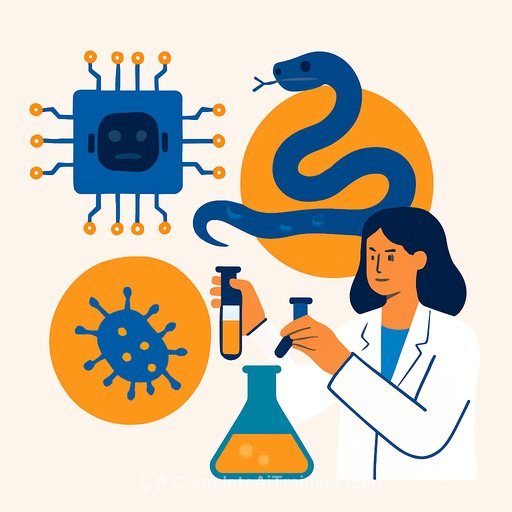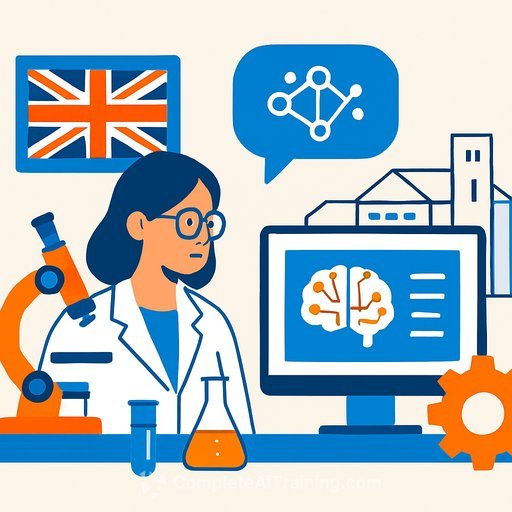Scientists use AI to turn venom into life-saving medicine
Venom, once feared for its deadly sting, is now being investigated as a source of new antibiotics that can fight drug-resistant bacteria. Researchers from the University of Pennsylvania have combined artificial intelligence with molecular science to explore venom’s untapped potential. Their findings, published in Nature Communications, analyze a vast global dataset of venom proteins and reveal promising peptides capable of killing superbugs without harming human cells.
A Global Health Crisis Meets New Scientific Insight
Drug-resistant infections are a serious and growing threat, contributing to an estimated 5 million deaths annually. The slow pace of new antibiotic development has left many infections difficult to treat, especially those caused by gram-negative bacteria. These bacteria have a tough outer membrane that resists many traditional antibiotics.
Venoms from snakes, scorpions, and spiders have evolved over millions of years to deliver potent peptides that target prey cells. These peptides can disrupt cell membranes, actions similar to how some antibiotics work. Yet their potential has been largely overlooked in antibiotic research—until now.
Artificial Intelligence Screens Millions of Venom Peptides
The research team employed a deep-learning system named APEX to process an enormous dataset of venom proteins. APEX analyzed 16,123 venom proteins and broke them into over 40 million peptide fragments, known as venom-encrypted peptides.
From this vast pool, APEX identified 386 peptides with structural characteristics favorable for antibacterial activity. These peptides typically have a high net positive charge and hydrophobic regions, enabling them to penetrate bacterial membranes. Their flexible α-helical structures resemble natural antimicrobial peptides known for disrupting bacteria.
“Venoms are evolutionary masterpieces, yet their antimicrobial potential has barely been explored,” explained Dr. César de la Fuente, the study’s lead researcher. “APEX lets us scan immense chemical spaces quickly and pinpoint peptides capable of fighting stubborn pathogens.”
Lab Testing Confirms AI Predictions
The team synthesized 58 top peptide candidates and tested them against multiple bacterial strains, including drug-resistant Escherichia coli and Staphylococcus aureus. Remarkably, 53 peptides effectively killed bacteria without damaging human red blood cells, indicating potential safety for therapeutic use.
Dr. Marcelo Torres, co-author of the study, noted that combining computational screening with laboratory validation enabled one of the most thorough investigations of venom-derived antibiotics to date. Dr. Changge Guan, a postdoctoral researcher involved in the work, added that their platform also mapped over 2,000 new antibacterial motifs—short amino acid sequences responsible for antimicrobial action.
Testing in Living Organisms Shows Promise
Several peptides underwent testing in mice infected with Acinetobacter baumannii, a problematic gram-negative bacterium linked to hospital-acquired infections. The peptides significantly reduced bacterial counts without signs of toxicity, a critical step toward developing safe antibiotics.
The researchers are now refining these peptides through medicinal chemistry to improve their stability and effectiveness for potential clinical use.
The Path Forward: Venom as a Source of Antibiotics
This study highlights a practical approach: using AI to accelerate the discovery of new antibiotics from natural sources. Venom peptides offer a rich chemical diversity that traditional methods have struggled to tap into, especially against resistant bacteria.
As antibiotic resistance continues to rise, exploring natural compounds like venom peptides could provide vital new treatment options. The combination of AI screening and experimental validation creates an efficient pipeline for identifying promising drug candidates.
For those interested in expanding their knowledge of AI applications in scientific research, resources and courses are available at Complete AI Training.
Your membership also unlocks:






